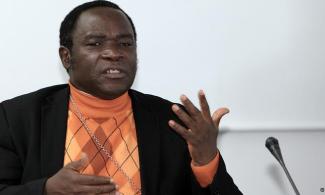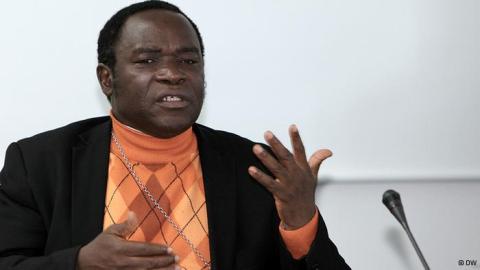
It is futile faulting him for a seemingly incurable tendency to spoil the occasion by limiting his horizon to the gallery immediately before him.
“Every door has its own key”. African proverb
I wish I did not have to write on the Christmas sermon of Bishop of Sokoto Diocese, Mathew Hassan Kukah, which appears to have gotten many segments of the nation all worked up. The Bishop and I have a close personal relationship resting, in part, on respect for each other’s tendency to speak their minds. I have commented on him and about him publicly in the past, and we have had discussions that I thought soothed nerves. He has a tough chin and a soft belly. He can withstand scathing responses to his provocations in public, but he hurts when they do not fit his definition of fair comment. His soft belly is, like all faith politicians, his permanent craving for being noticed and important. The oxygen is attention, and the perennial search for it can take you to dizzying heights of distinction among mortals, or to the depths of opprobrium and ignominy. Every once in a while, they stoke fires that do some harm or good but even definitions of good and bad tend to become intimately personalised.

I will not join the lynching party against the Bishop, and I certainly will not escort this lamentable dip in the poor quality of commentaries about the state of the nation, which I suspect will find some accommodation in circles I will not waste one second around. There is enough in the Bishop’s sermon that leaves him open to being accused of scoring a vital goal for the other side and doing it only to show that he can score goals. He cannot be impeached for speaking in accordance with his tradition: championing a cause for a Christian community, which suffers from permanent persecution from Muslims in power who do no justice to themselves or to those they oppress. It is futile faulting him for a seemingly incurable tendency to spoil the occasion by limiting his horizon to the gallery immediately before him. It will serve no purpose to accuse him of lacking in bridge-building expertise. He is a Catholic priest whose boundaries are defined strictly by his faith and his occasionally hazy perception of the interests of his flock.
In a period when there is a near-universal consensus that we are living (and dying) under the most incompetent and uncaring administration, Bishop Kukah handed over a huge advantage to a leadership that has barely a handful of Nigerians who will speak for its record. It is difficult to understand what exactly he wanted to achieve with a rambling sermon that would give very little comfort to his constituency, but a lot more unnecessary worry to many Nigerians of all faiths. The reference to a military coup in any context will offend Nigerians. We have spent a decade under two administrations that will go down in history as the worst managers of crises and conflict, and the military has been both a victim and a facilitator in this disastrous decline. The mere mention of the military in government, whatever its grounds, offends the earned right of Nigerians to live under elected leaders, and to change them through democratic means. The Bishop’s conjecture that the military would have overthrown a non-Northern Muslim president with a fraction of the sins of President Buhari is fiction from a mind bent on operating from very narrow religious prisms. The mention of a possible war arising from nepotism ignores the reality that the nation has been fighting and losing a war with criminals because those the Bishop thinks are benefitting from nepotism have failed woefully to stem the tide of violence swamping citizens of all faiths.
The Bishop played many poor hands in this game. The reference to nepotism, which could have provided an impetus to a coup, was made in a manner that suggests that the Bishop was clutching at straws. The biggest liability of the Buhari administration was not where he sourced his appointees from, but their pronounced incompetence. If a president is content with mediocrity and incompetence, he could fill all positions with Nigerians from all local governments in Nigeria and still run an incompetent and ineffective government. The Bishop comes from a state and a part of the country that has bled very badly from the ineffectiveness of the leadership of the Nigerian State to protect citizens. A popular wasting game among many Nigerians is to list key positions in the military, policing, security, and judicial institutions and attach geographical tags to them. From there they draw conclusions about nepotism and exclusion. If the President will replace top leaders of the military with officers who are predominantly from the south and Christian and winning the war against armed criminals, northerners are unlikely to worry.
Other Nigerians may indulge in the luxury of this game, but northerners ask what value all the people who serve at the pleasure of President Buhari add to their lives. From Borno to Sokoto, Niger to Taraba, northern communities now live with non-governance and utter neglect. Massive spaces in our lives have been taken up by violence. There is no part of the North or Nigeria that will qualify or accept to be ‘Buhari’s North’. Every community, all faiths, all classes are victims of his poor governance. The constituency he abandoned is Nigeria, and daily bloodletting, kidnappings and banditry bear ample testimony to the national impact of the failure of President Buhari to govern well. Where, then, does the Bishop draw the line that suggests that Christians are worse-off than Muslims under this president who has provided a level playing field for violence and poverty to eat up the soul of the nation?
The suggestion that killings are part of a grand religious design carries with it an obligation to prove. Muslims also want to know if they, dead or alive, are part of that grand design. Has the Bishop heard of Zabarmari, Kankara or dozens of towns and villages all over the North where people are killed, kidnapped or raped daily, the vast majority of them Muslims? The reference to having a ‘pool of violence to draw from’ will justifiably offend Muslims. It is a provocation with no justification and leads to the question: why is this pool of violence useless against bandits and kidnappers and insurgents? In the Bishop’s neck of the woods, Christian villagers fight sundry enemies. Does Christianity provide them from its pool of violence too?
Northern Elders Forum had called on President Buhari to resign out of honour at least, or out of respect for the mandate, he will not exercise. Government spokesmen called it irresponsible for suggesting that an elected president who cannot protect all citizens should resign. Majority of Nigerians supported the Forum. The Sultan of Sokoto recently spoke up over insecurity in the North, not about Muslims. It had a major impact on the morale of all northerners who thought they were alone. After that, Zabarmari happened. Kankara happened. More and more people of all faiths discover daily that they have no cover from the State. It gets worse by the day.
Bishop Kukah’s Christmas sermon was a great disservice because it yielded ground to an administration, which does not deserve an inch. It played today’s politics with yesterday’s weaponry. It was the wrong thing to say to beleaguered Christians on a day that should restore faith and hope. It draws attention to the messenger, not the message, and makes what he says of little value. It causes a major breach in the solid wall of outrage from all communities over common challenges they face.